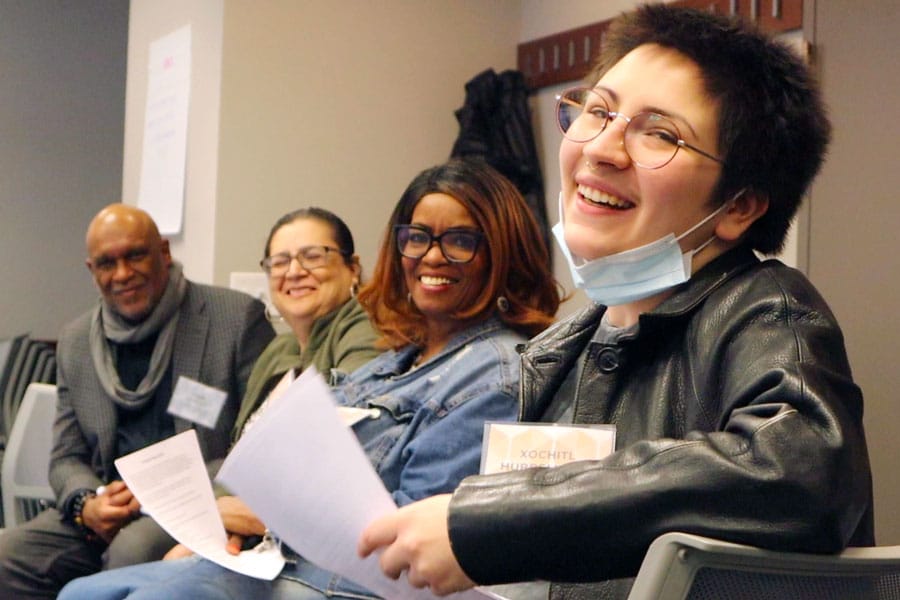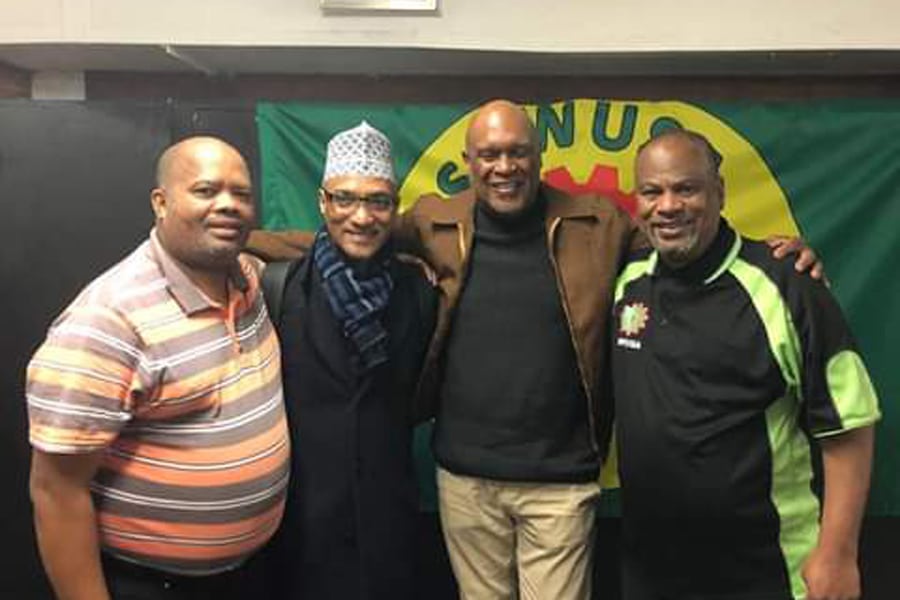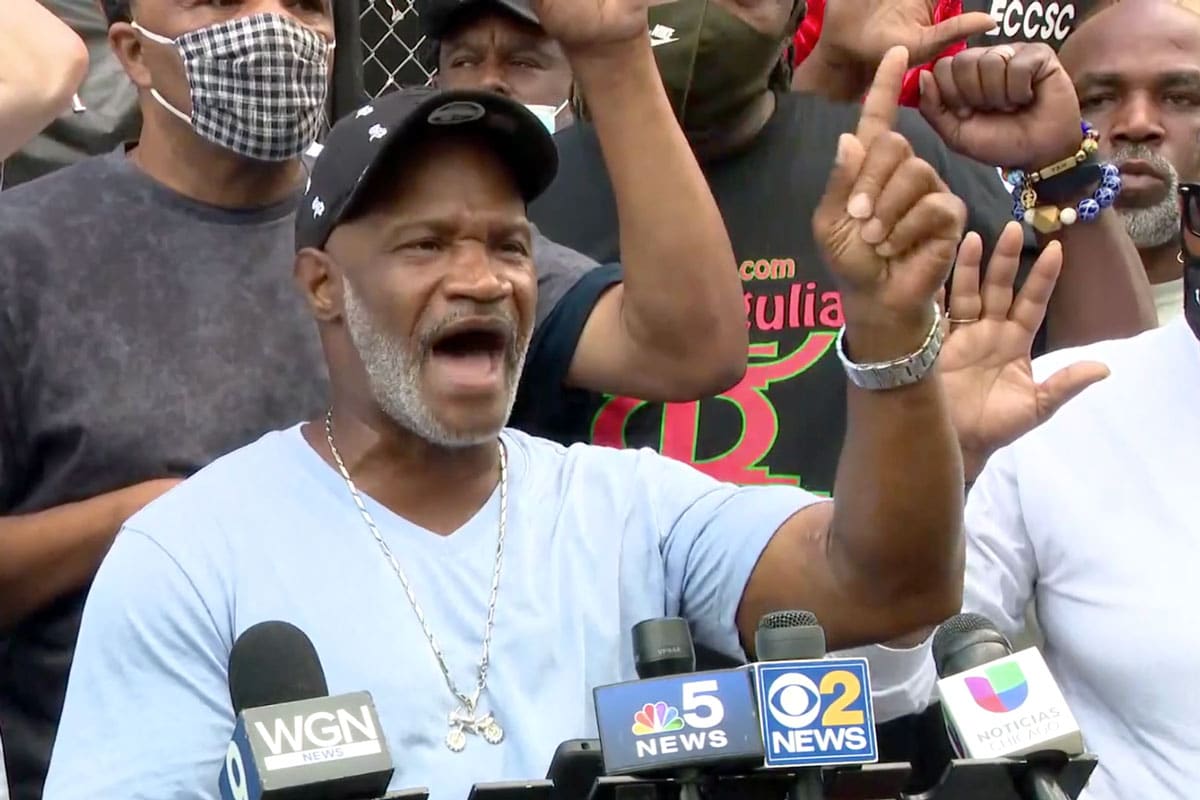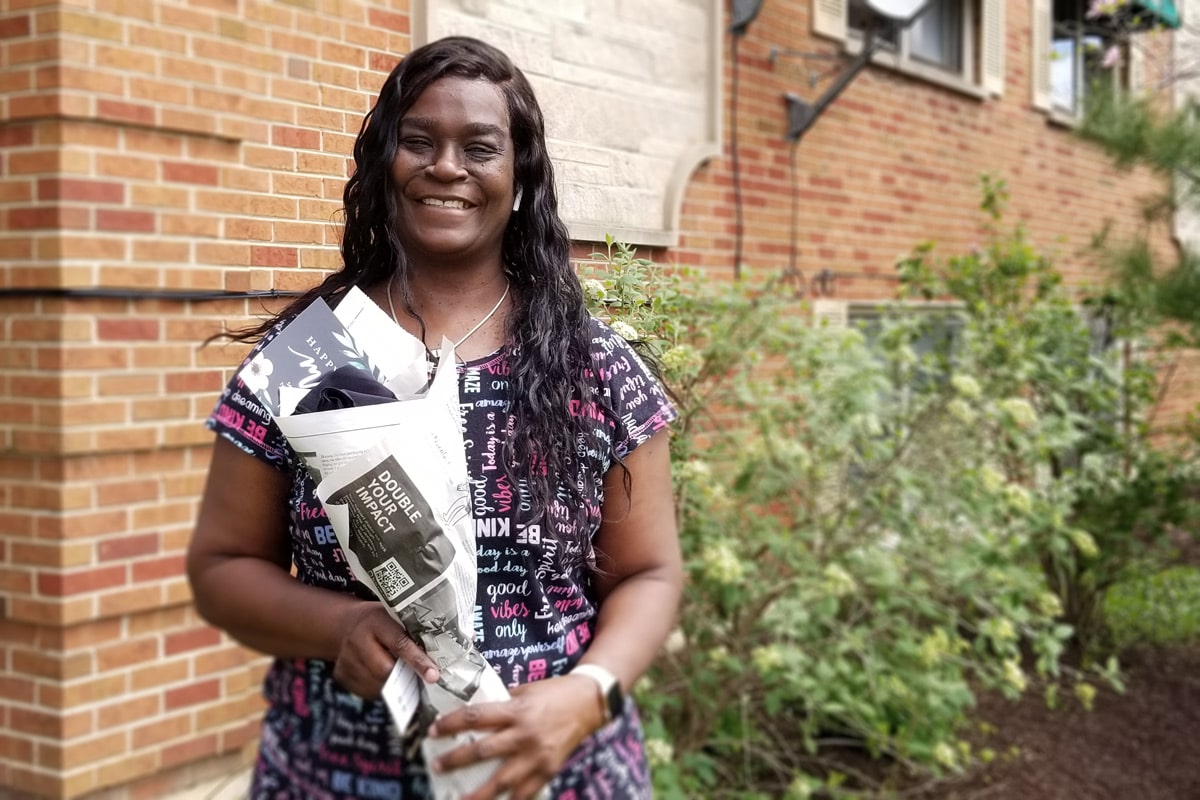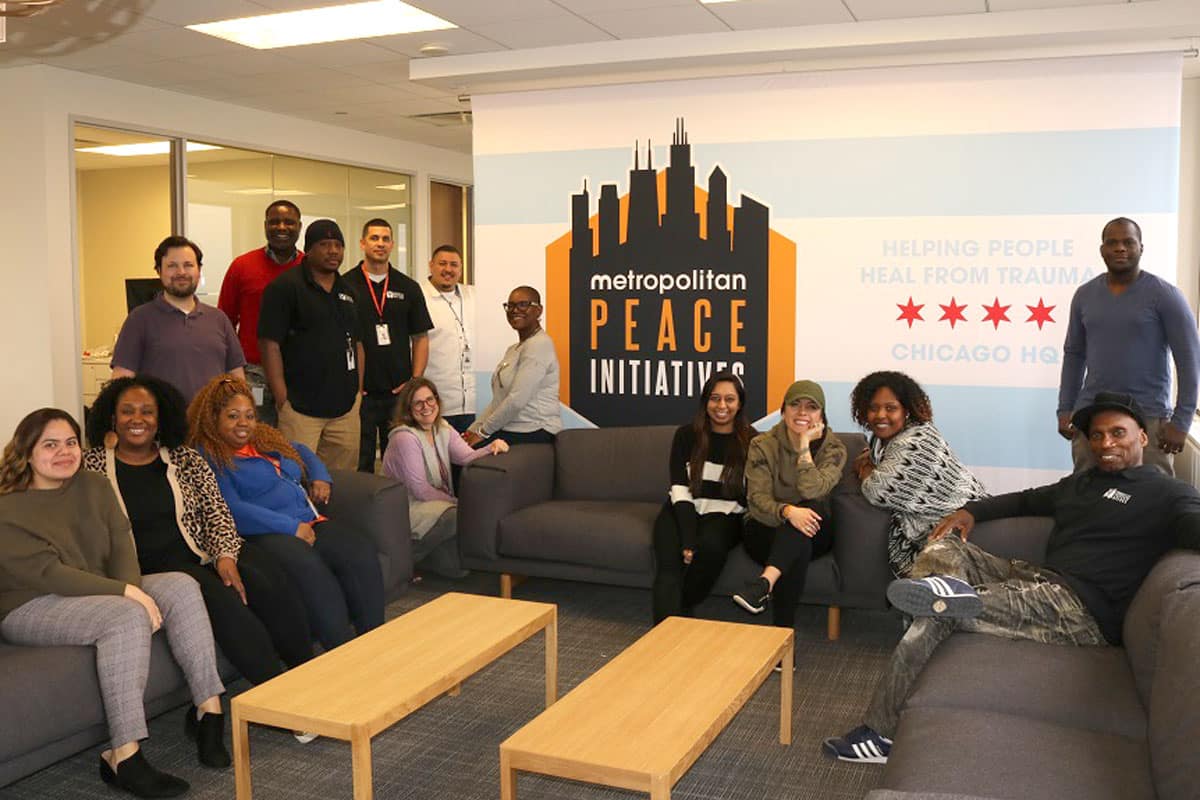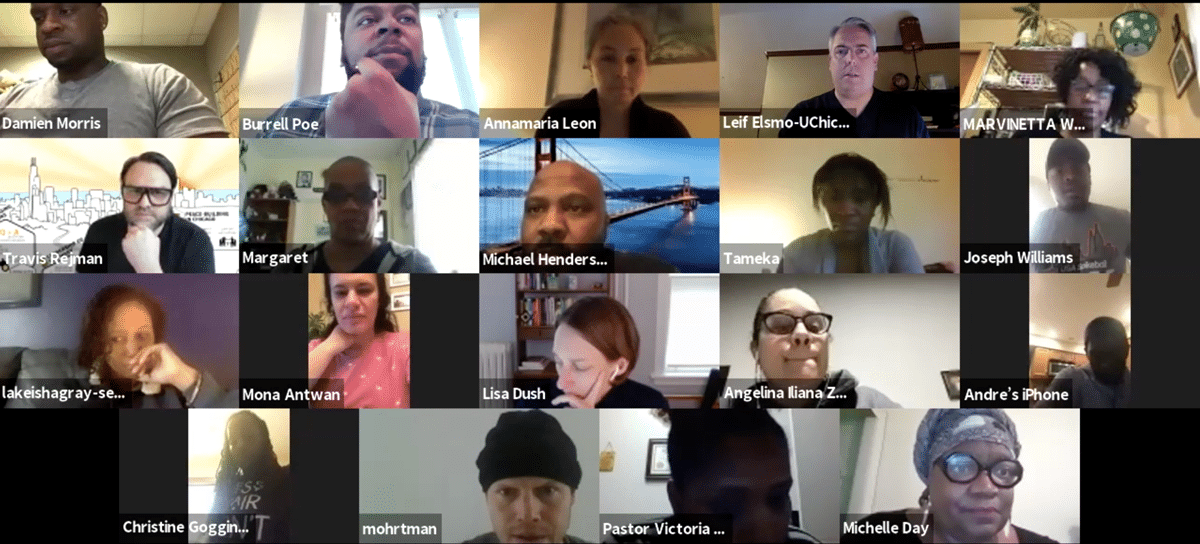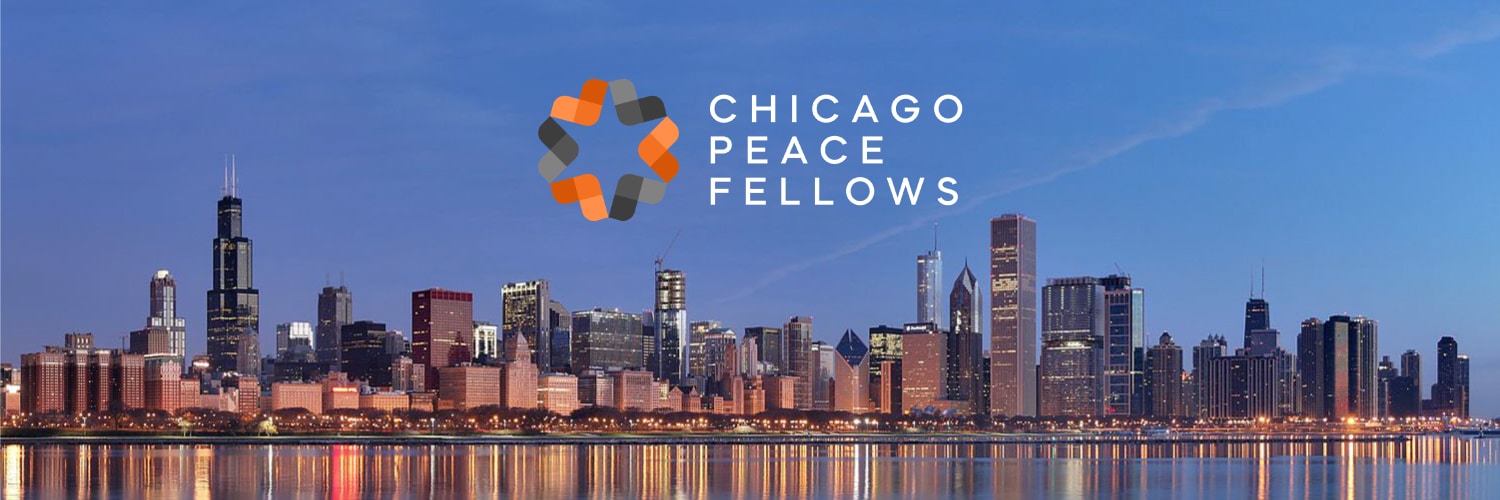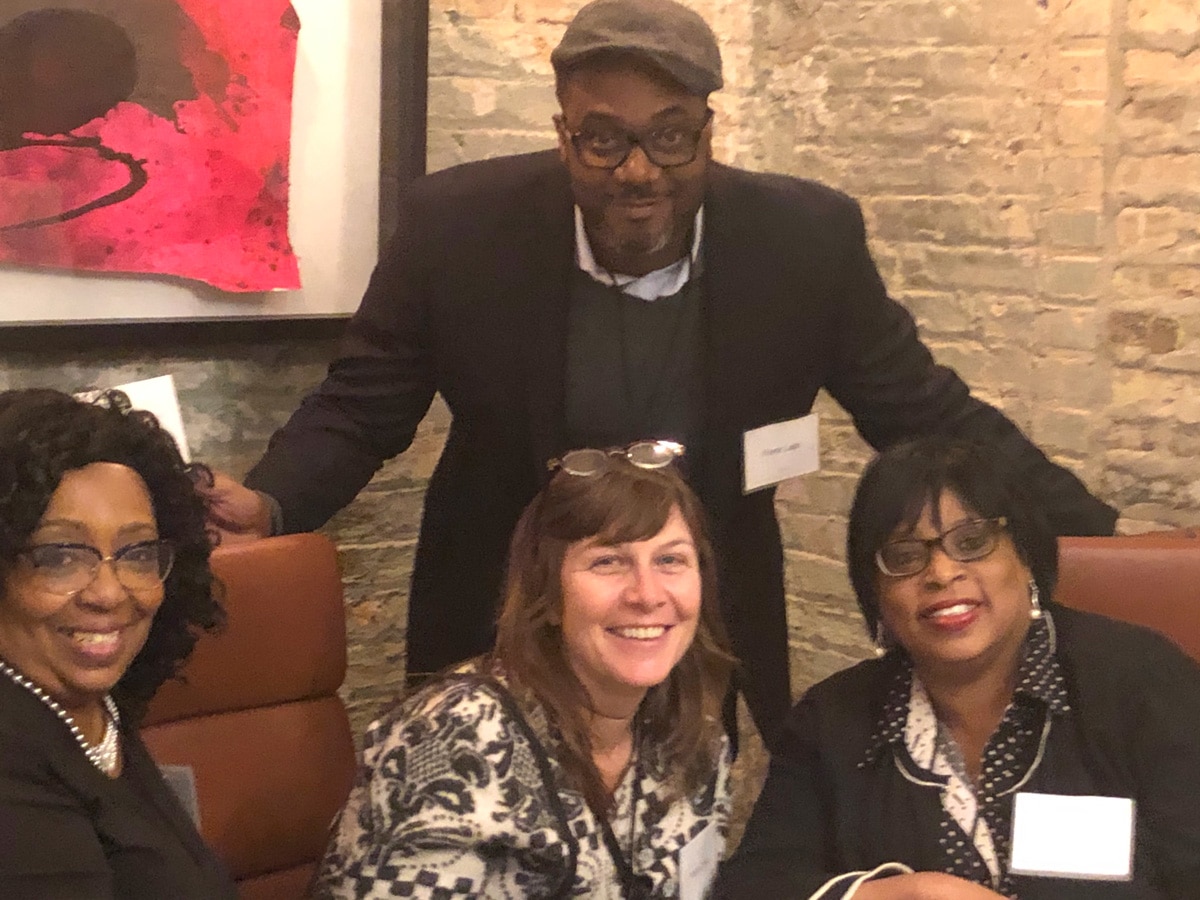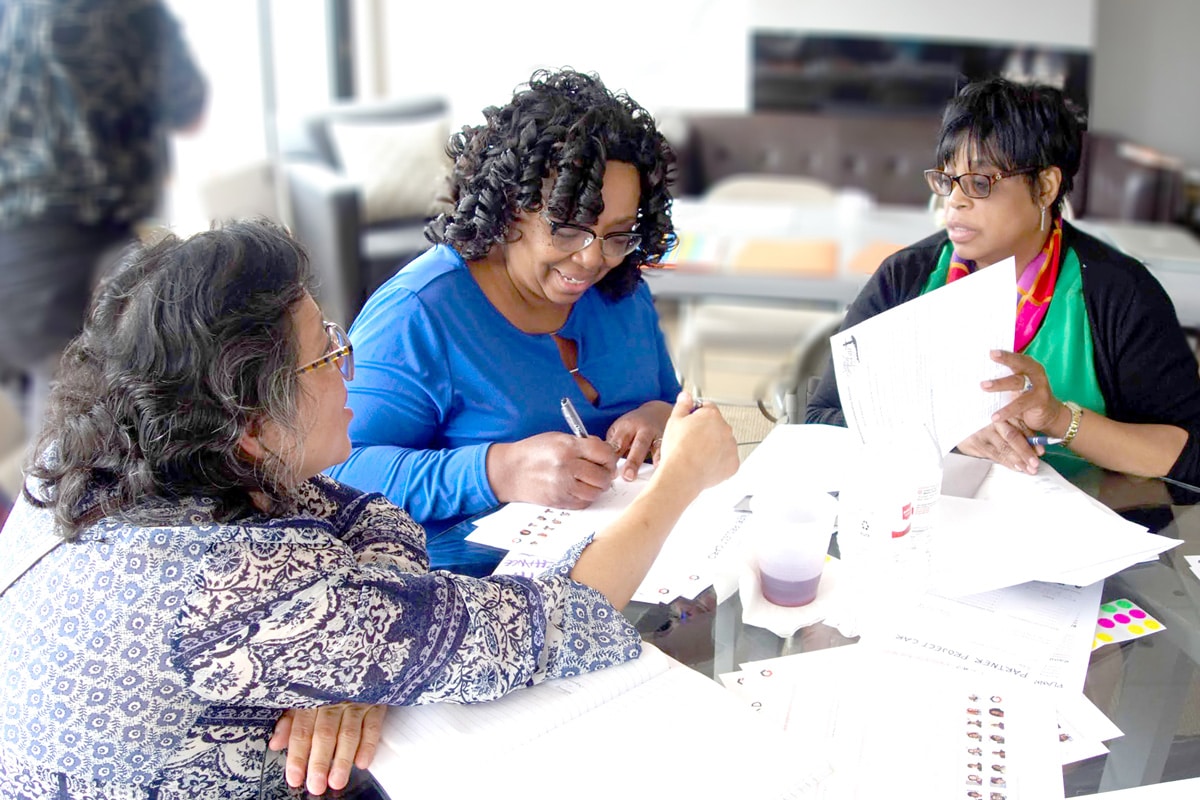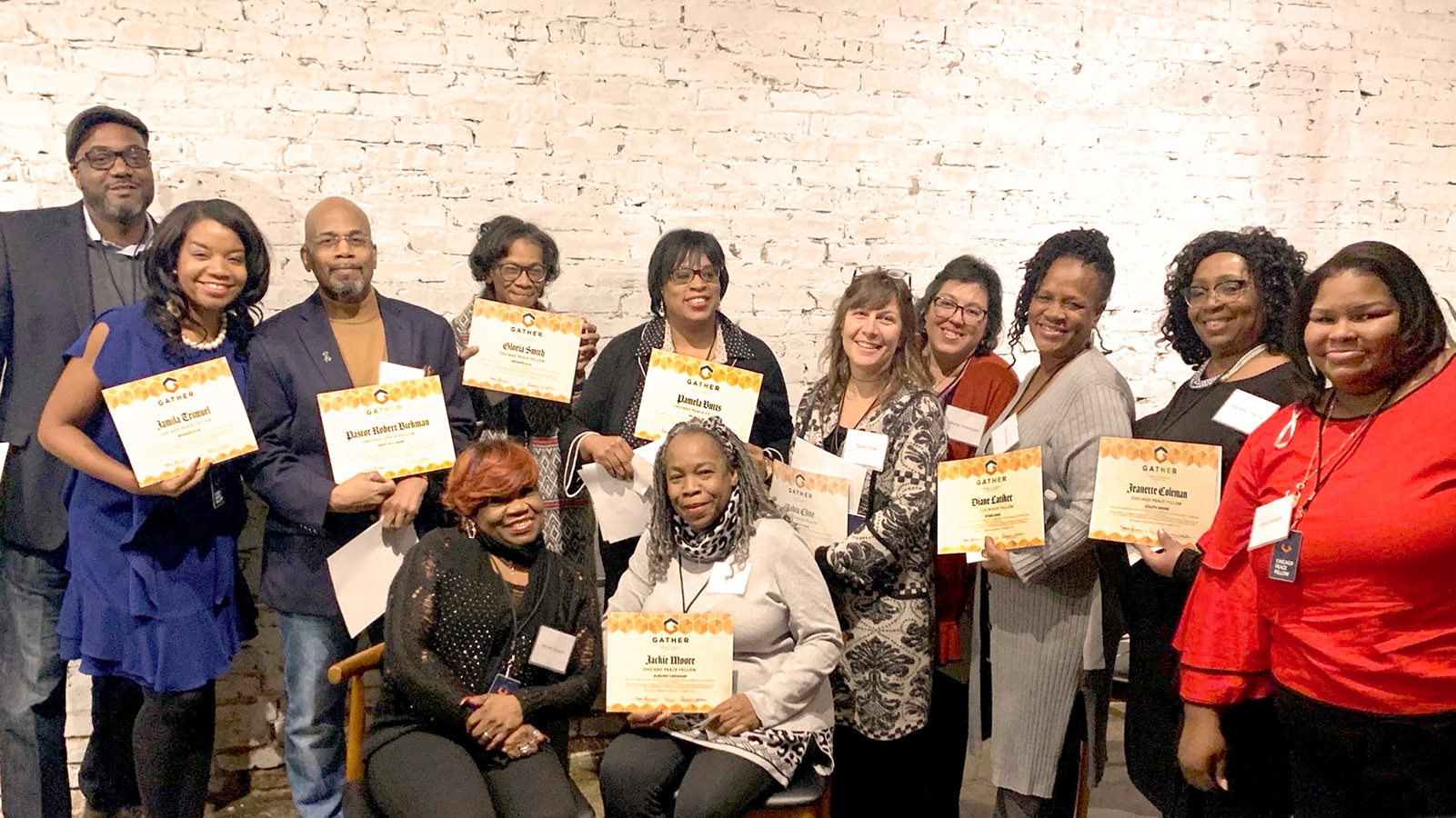2022 Chicago Peace Fellows Launched
On April 28, the 2022 cohort of the Chicago Peace Fellows met for the first time at the DePaul Center. The 2022 Peace Fellows cohort consists of activists, artists, social workers, and community leaders representing 14 community areas on the South and West sides of Chicago. Founded in 2019 in collaboration with the Partnership for Safe and Peaceful Communities, the Chicago Peace Fellows program is the only leadership development program that is built by and for grassroots community leaders on the South and West sides of Chicago.

The 2022 Peace Fellow Cohort will be the fourth group of Chicago Peace Fellows, following in the footsteps of over 60 alumni and joining a global network of Alumni featuring more than 100 grassroots leaders in over 30 countries. Pastor Reshorna, a 2021 Peace Fellow, spoke at the launch event and emphasized the value of the skills the Peace Fellows curriculum taught her. She spoke to the importance of learning an asset-based approach to community engagement:
"We had the opportunity to do asset mapping, to go out into our communities and see what was already there. Because most often, when we talk about our communities, people talk about what we don’t have. Well this approach says, ‘what do you already have in your community, what can you use to build on that, and how can you work with people to improve on that."

The 2022 Peace Fellows were also welcomed by Guillermo Vásquez de Velasco of DePaul University and Deborah Bennett of the Polk Bros. Foundation. Both Velasco and Bennett spoke to the lasting influence of the Peace Fellows program and its ability to provide tools and connections for grassroots leaders.

Peace Fellows were given a preview of the GATHER curriculum that they would be participating in over the course of their Fellowship. GATHER is both a mobile platform for shared learning and a curriculum for people who want to build on the talents of their neighbors and the assets of their communities to make real and lasting change. Members of the Goldin Institute emphasized that the Peace Fellows curriculum is not like a typical high school or college class, but is for Peace Fellows to gain new tools and networks for their efforts at community engagement.

Through the GATHER platform, the 2022 Peace Fellows will engage in a 22-week course of intensive shared learning as well as group projects, culminating in a graduation event in September 2022. The curriculum has been designed in collaboration with grassroots leaders, based on their practical knowledge and hard earned wisdom.
At their first meeting, the new Peace Fellows also had time to get to know one another and explore the diverse interests, skill sets, and leadership styles of their peers. The 2022 cohort consists of leaders from a variety of backgrounds, including street outreach, pastoral work, violence prevention, and the arts. The launch provided opportunities for Peace Fellows to speak with one another about their interests and work as well as explore their different leadership styles. Peace Fellows explored their strengths and needs as leaders through a leadership compass activity, where they grouped themselves categories derived from the cardinal directions. Many Fellows understood themselves as being in the Southern or Western parts of the compass, having empathetic or analytical leadership styles. However, as they discussed their strengths as leaders, the Peace Fellows explored how they often fell into different styles to suit their circumstances, sometimes falling into the Eastern “idea-oriented” or Southern “action-oriented” sides of the compass.

As the 2022 Peace Fellows progress through their curriculum, they will continue to build on the strength of their diversity through a series of collaborative projects. The 2022 cohort is made up of motivated problem-solvers and community-builders and their strengths will be shared as they take on community-oriented projects. After a series of GATHER based workshops, the Peace Fellows will have the opportunity to use the new techniques and concepts they’ve learned in collaborative projects. The diverse skills of the Peace Fellows will go on to form projects that aim to have a continuing impact preventing violence and remediating its consequences.
Chicago and Cape Town Collaboration helps Capture History
By Reverend Berry Behr, 2021 Global Fellow, South Africa
A collaboration between two DePaul University students and the Cape Town Interfaith Initiative (CTII) has yielded a rare treasure – funding for the recording of an important personal account from an interfaith stalwart as part of our efforts to capture an oral history of the interfaith movement in South Africa.

As part of the DePaul students Intro to Non-Profit Management course at DePaul University with Professor John Zeigler, these students were inspired to volunteer to support this project across the globe when they heard about CTII’s Oral History Project. The students asked how they could help, and learned that each oral history recording costs in the region of USD500. So they immediately set to work, creating a GoFundMe campaign and reaching out to their friends and family.
Within just a couple of weeks, DePaul students Jenna Dahbur and Reese Elledge had raised enough to fund a recording for the archives of the significant interfaith work that contains many lessons of harmony, understanding and collaboration between diverse religious leaders in Cape Town.
"These oral history testimonies capture the interfaith efforts to end apartheid from those leaders on the front lines. We can preserve their stories that teach us so much about ending regimes of discrimination and the healing of communities from the wounds of separation."

In a beautiful twist of destiny, the funds will be used to record the story of Imam Rashied Omar who not only lectures at Notre Dame in the US and therefore contributes to the global body of knowledge on interfaith engagement, but is also a long-time friend of the Goldin Institute and an associate of Professor Ziegler who facilitated the collaboration between the students and CTII.
CTII looks forward to further collaboration with DePaul University students and is extremely grateful for their significant contribution.
Enough is Enough: Fellow Raymond Richard Calls for Peace After Senseless Murder
In the wake of the senseless murder of 9-year old Janari Ricks, Global Goldin Fellow Raymond Richard joined peace builders from across the city to host a call for an end to the violence that is on the rise in Chicago.

The Founder of Brothers Standing Together, Raymond is also a resident of the near north side community where the murder of Janari Ricks took place. The murder hit home for Raymond in a personal way, as Janari is part of his extended family.

This is my community. I came back home to help as many people as I can help and save as many lives as I can save. Unfortunately, his life wasn't saved. So that means we dropped the ball. The men dropped the ball.
In his impassioned plea for the murders to stop, Raymond continued:
But we are here to say today, "Enough is Enough" and it's over with. We will no longer stand by idle while our children are being slaughtered at an alarming rate.

After calling for the shooter to turn himself in, Raymond continued:
To the children: I pledge to do all I can do to make your lives safe, even if it means laying down my own life... We as a people must get involved to stop the bloodshed of our people. It doesn't matter the color. We're dying at an alarming rate and we must take a stand now.
Raymond Richard is an Alumnus of the inaugural class of Global Goldin Fellows in 2018, a cohort of 20 passionate grassroots leaders from 16 countries from Africa, Asia, Europe, the Middle East and North and South America.
Click here to read the watch the video on WGN9 News.
Peace is Blooming in Chicago
On Sunday, May 3rd the Chicago Peace Fellows launched the Peace Flowers campaign by delivering over 75 flower bouquets to mothers that have lost children to violence.

The Peace Flowers campaign is a collective response from the Chicago Peace Fellows Mutual Aid Collaborative comprised of 38 peace organizations throughout Chicago who are working togehter to address the twin epidemics of COVID-19 and violence in Chicago.
Violence is rising in Chicago in the same south and west side neighborhoods most impacted by COVID-19 where the Peace Fellows live and work. With funding for frontline peace-building organizations often diverted to respond to the coronavirus, the Mutual Aid Collaborative is building sustainable social impact models to raise funds and create jobs.

"Peace Flowers is an innovative and easy way to fund these organizations while also investing in sustainable job creation on the south and west side of Chicago where these lovely blooms are grown."
Quilen Blackwell, Chicago Peace Fellow, Chicago Eco House

Pamela Bosley, Co-founder of Purpose Over Pain, works with mothers to connect them with each other to build a community of support.
“Many of the moms have a hard time with Mother’s Day. With the pandemic, it’s been even harder. Many mothers are reporting problems with depression and other issues related to being disconnected.”
Pamela Bosley, Chicago Peace Fellow, Purpose Over Pain
Quilen Blackwell, Owner of Southside Blooms, a social enterprise that helps youth in Englewood find opportunities in urban farming. They work to build a sense of entrepreneurship to help youth see opportunity and way out of drug trade. Quilen saw an opportunity to support Pamela’s group by providing them with beautiful bouquets in honor of Mother’s Day and to help lift their spirits. “The flower market is in huge disruption right now. 80% of flowers are imported from overseas and due to the trade issues related to the corona virus, most flowers need to come from domestic sources.” Quilen noted.

AnnaMaria Leon, Co-owner of Homan Grown, saw a collaboration in the making. She noted how this idea can be more than just a single action but, can be a part of a broader strategy to support mothers and fund projects for the Chicago Peace Fellows. She contacted her friend, Pascal Sabino, a local reporter for Block Club Chicago who wrote a powerful article about the project. The story was also featured by ABC7 in this compelling feature.
Once the funding and logistics were done, the team came together to prepare and deliver the flowers. The flowers were delivered to families across Chicago and the surrounding suburbs. The deliveries added a personal touch because they were distributed by Southside Blooms, Annamaria, and myself as Director of the Chicago Peace Fellows.
"I personally got the witness the joy and gratitude of the moms who received bouquets. It was a very moving experience to hand out flowers and cards that reminded the moms “You are not forgotten.”
Burrell Poe, Director, Chicago Peace Fellows
The deliveries were bittersweet, acknowleging the loss of family members but also because the deliveries were contact-less. No handshakes, no hugs, and at least 6ft of physical distance. Masks, gloves and hand sanitizer made this gesture different that it would have been prior to COVID-19. However, it made it all the more important because, people are suffering on top of the suffering that has already befallen their lives.
"Wonderful. Wonderful, it really made my day," said Elizabeth Bolden, a mother who received the bouquet.
The project has thus far raised over $5000 on GoFundMe and is entering into the next phase of it's social impact model where the public can purchase a subscription for flower delivery that also funds violence prevention work through the Chicago Peace Fellows Mutual Aid Collaborative.

Project oragnizers at Southside Blooms and Homan Grown will hire local youth to grow and arrange the flowers and donate a percent of their sales through the Peace Flowers campaign to support this network grassroots peace organizations on the West and South sides of Chicago plagued by the twin epidemics of violence and COVID-19.
"The goal is to create a long term sustainable funding stream for peace organizations in Chicago so that these groups have greater freedom at doing what they do best: making Chicago a more peaceful and beautiful place to live!"
Learn more about the Peace Flowers program at SouthSide Blooms
Peace Fellows Meet With Metropolitan Family Services

On Wednesday, April 8th, the Chicago Peace Fellows hosted a conversation with Metropolitan Family Services (MFS) to learn about their efforts to reduce the amount of gun violence in the city. MFS talked about three of their specific projects: Communities Partnering for Peace (CP4P), The Metropolitan Peace Academy, and Lights in the Night.
The Chicago Peace Fellows learned about the work of these interrelated projects to reduce violence, heard directly from program directors about their experiences, and explored how they can best be involved.
Communities Partnering for Peace, the Metropolitan Peace Academy, and Lights in the night are strategies meant to support community-based organizations provide on the ground services in communities across Chicago. Domonique Mccord, Director of Community Behavioral Initiatives, explained that the role of MFS in CP4P is to bring smaller community-based organizations together and provide professional services such as accounting, human resources and mental health services that would be difficult for street outreach organizations. MFS provides these services to organizations across the city.

The Chicago Peace Fellows also learned about the Metropolitan Peace Academy which seeks to professionalize street outreach and create a learning institution to share best practices across organizations. Vanessa Dereef, Director of the Metropolitan Peace Academy, shared that it is important for outreach workers to build relationships to support one another across the city. Several Chicago Peace Fellows were familiar with the Lights in the Night program which runs programs at night in public places over the summer. Several Fellows have participated in these activities and learned more about how they can be involved.

The Chicago Peace Fellows were really interested in how they can support the activities of MFS and be involved as community leaders in street outreach. Steve Perkins, Director of Outreach, explained that they can learn more about the street outreach organizations in their neighborhoods and share information when it’s appropriate. He encouraged fellows to participate in community activities and to get to know the people in their neighborhoods.
Violence as an Adaptive Challenge
On Thursday, March 26, the Chicago Peace Fellows participated in a workshop titled ‘Violence as an Adaptive Challenge’ with staff members at the University of Chicago Medical Center’s Violence Recovery team. This is the second workshop in the GATHER course, and the Fellows discussed issues related to solving complex, amorphous problems in the communities they serve. They were joined by staff at the University of Chicago Medical Center for Community Health and Vitality, who shared useful information about staying safe from COVID-19 and answered the Fellows’ questions relating to how they can protect themselves and their neighbors. Due to the social distancing efforts going on in Chicago to stymie the spread of COVID-19, this workshop was conducted online via video conference software.

The Violence as an Adaptive Challenge workshop was conducted with the Violence Recovery team at the University of Chicago Medical Center. They started the call by explaining their role in the trauma center, which is to connect with victims of intentional violence, i.e. gunshot wounds, knife attacks and other injuries that come to the trauma center. When they connect with victims, they try to find resources in the hospital and community to help solve other problems they may have besides their injury such as housing, food insecurity or mental health. The program is meant to deal with what they call the Social Determinants of Violence so as to keep people from having to come back to the hospital. The program has been in operation for almost 2 years and started when the Level 1 trauma center opened in May 2018. They explained that they are one of the few violence recovery teams in the nation.
The Peace Fellows asked questions about how their operation works in the trauma center and how successful their work has been. The Fellows also asked about how their work connects with community-based organizations to provide a network of support for the individuals that come into the hospital’s care. The Fellows inquired about how they could collaborate with various community institutions such as the Chicago Police Department. The Fellows shared the various services they provided and offered to support the violence recovery team. Many of the violence recovery specialists are members of the community who have similar backgrounds to many of the victims of violence, particularly gun violence.
“One of the things we are big in is preventing reinjury [victims coming back to the trauma center with new injuries] risk,” explained Dre, a violence recovery specialist. “That starts as soon as they get in. We work to understand if they are in danger or if it is an ongoing situation.”
To round out the call, the Peace Fellows spoke with Dr. Doriane Miller, director of the Center for Community Health and Vitality. Dr. Miller explained basic information that community members need to know about the symptoms of COVID-19 and how the virus is transmitted. The Fellows asked questions and dispelled myths about who can contract the virus and whether certain home remedies are effective.
Please visit the University of Chicago Medicine website for more information. Or visit the City of Chicago COVID-19 Portal.
Meet the 2020 Chicago Peace Fellows
The Goldin Institute invites you to learn about each of our 2020 Chicago Peace Fellows representing 14 community areas across the city. Founded in 2019 in collaboration with the Partnership for Safe and Peaceful Communities, the Chicago Peace Fellows program is the only leadership development program that is built by and for grassroots community leaders on the South and West sides of Chicago.
Peace Fellows participate in GATHER, an online asset-based community engagement course, as well as in-person training, collaborative action projects, and networking experiences with civic leaders, academic researchers, and policy makers. The Chicago Peace Fellows reduce violence by building relationships, engaging youth, collaborative peace building projects over the summer and by creating new networks among residents, families, schools, and nonprofit organizations.
ABOUT GATHER
The Fellows are learning together through GATHER, which is both a mobile platform for shared learning and a curriculum for people who want to build on the talents of their neighbors and the assets of their communities to make real and lasting change. Gather Fellows learn and work together through an innovative curriculum that comes pre-loaded on a tablet device with all the connectivity, materials, videos, practices and tools necessary to provide a mobile classroom and toolkit for community leadership.
The Chicago Peace Fellows project will connect and equip a select group of past grantees of the Chicago Fund for Safe and Peaceful Communities to reduce violence and promote peace. Chicago Peace Fellows will be the second all-Chicago cohort to utilize the GATHER platform, an online learning hub built by the Goldin Institute to empower grassroots leaders.
The participants have been selected from past grantees of the Chicago Fund. They will engage in a 14-week course of intensive shared learning as well as group projects, culminating in a graduation event in October, 2019. The curriculum has been designed in collaboration with the grantees themselves, based on their practical knowledge and hard earned wisdom, with input from a wide range of civic leaders. Fellows will reflect on their past summer work, identify successes and lessons learned, and improve their abilities by sharing strengths and learning new skills.
The Goldin Institute and the Partnership for Safe and Peaceful Communities have aligned missions that value authentic community leadership. The Chicago Fund is uniquely effective at finding motivated problem-solvers and community-builders. By connecting Chicago leaders through GATHER, their efforts to nurture safer and more peaceful communities will be more effective, interconnected and lasting.
A special thanks to the Conant Family Foundation, JP Morgan Chase, the Polk Bros. Foundation, Crown Family Philanthropies and the Partnership for Safe and Peaceful Communities for making this program possible.
To follow along the learning journey with the Gather Fellows, please sign up for our newsletter and follow up on Twitter, Facebook and Instagram.
If you would like to apply for the next cohort of Gather Fellows, please visit apply.goldininstitute.org.
A Night to Remember!
By Frank Latin, Senior Advisor, Communications
For me, the Goldin Institute’s 2019 Chicago Peace Fellows graduation ceremony was an inspiring event. The ceremony marked the completion of a six-month fellowship in which myself and 18 other committed community leaders collaborated to complete an engaging, community-focused curriculum and attend other scheduled workshops. The Chicago Peace Fellow program, with the use of its GATHER platform, is designed to share new social change tools and concepts that can assist in creating safer and more peaceful communities with individuals who already working in high-need areas on the South and West sides of Chicago.

The event attracted close to 100 people, including family, friends, colleagues and civic leaders who showed up to acknowledge the collective work of the CPF graduates. The group is comprised of individuals who lead small organizations and do not allow our even smaller budgets to deter us from doing the work that our communities so desperately need.

Our budgets and our organizations are small, but our work has a huge impact in the communities we serve.
To be honest, it was a pleasant surprise to see so many people come out to honor the work of a small group of people whose work often goes unnoticed by the mainstream. The evening came full circle for me when I ran into an old colleague at the event, Susana Vasquez, who I hadn’t seen in a while. Susana volunteered to conduct our first strategic planning session over 12 years ago. The mission and vision we crafted back then has helped guide me to this point...And here we are, the Westside Media Project is now in its 14th year of engaging and empowering community residents to utilize digital media to tell their own stories.

In the end, the ceremony not only celebrated the work of the 2019 Chicago Peace Fellows, it also highlighted one of the core beliefs at the Goldin Institute that is not universally shared throughout the philanthropic community: Leaders of color who live in the communities in which they serve are more than capable of providing solutions to problems that exist in their communities.
The Goldin Institute thanks the Conant Family Foundation, the Polk Bros. Foundation, Chase Bank, the Partnership for Safe and Peaceful Communities and our generous network of champions for community driven social change for supporting the Chicago Peace Fellows
Download the Graduation Booklet to Learn More
2019 Chicago Peace Fellows Report
For nearly two decades, the Chicago-based Goldin Institute has worked to build the capacity and amplify the voices of grassroots organizers in communities contending with the most challenging circumstances on Earth. In late 2018, the Goldin Institute was asked to design a course for grassroots organizers by the Partnership for Safe and Peaceful Communities, a coalition of 40 Chicago-based foundations who are aligning their investments to support proven and promising approaches to reducing gun violence. The Goldin Institute relied on its extensive global experience to create the Chicago Peace Fellows.
The Peace Fellows is a curriculum and fellowship designed to support individual organizers who are prior grantees of the Partnership’s Chicago Fund and are working to stop violence and create opportunities for their neighbors to collaborate in promoting more peaceful communities across the city. The inaugural class of 18 Peace Fellows graduated in November 2019 after more than six months of collaborative learning and joint projects.

The Goldin Institute designed the Peace Fellows course in collaboration with previous Chicago Fund grantees and input from a wide range of civic stakeholders. Based on the advice they received, staff adapted GATHER, the Goldin Institute’s tablet-based curriculum that teaches a series of core social change concepts and tools for authentic community engagement for grassroots leaders across the globe, to fit the newly formed group of local neighborhood changemakers, enhancing the online course with in-person workshops and meetings with a wide range of civic leaders in Chicago.
The 18 Chicago Peace Fellows were selected from a pool of over 50 applicants who all live and work in community areas on the city’s South and West sides that are disproportionately affected by crime and violence. Each Peace Fellow received a stipend and an iPad pre-loaded with the GATHER software and curriculum. Connecting Chicago leaders through GATHER allowed Fellows to explore key concepts around social change and leadership development digitally while they continued playing key roles in their community organizations as they completed the course.

On March 8, 2019, the Peace Fellows convened at DePaul University for the launch of the program where they discussed their leadership styles and got to know their peers. Over the following several weeks, the Chicago Peace Fellows developed deep bonds and determined together the principles and practices that would enable them to learn and work together as a community of practice.
The experience continued through the exercises in the curriculum and a wide variety of in-person workshops highlighting key violence prevention skills and introductions to other organizations doing important violence prevention work in the city. Fellows also had access to elected officials and institutional leaders in Chicago and beyond.

Throughout the program, Fellows participated in over 50 events and workshops hosted by partner organizations, including:
- The City Club of Chicago presentation on Crime and Criminal Justice in Chicago led by Professor Jens Ludwig of the University of Chicago Crime Lab.
- A meeting with the Violence Interruption Team at the University of Chicago Trauma Center.
- A conversation with author Edgar Villanueva about his book, “Decolonizing Wealth.”
- A conversation with Chicago artists on the Role of the Arts in Social Justice followed guided tour of the Chicago Cultural Center exhibit by Cecil McDonald, Jr.
- An Asset Mapping workshop with John Zeigler of the DePaul’s Egan Center and the Asset Based Community Development Institute.
- A workshop on appreciative inquiry followed by a guided tour of the Garfield Park neighborhood with the outreach team at Breakthrough Ministries.
- A presentation by Chicago Police Department Superintendent Eddie Johnson with a question and answer session.
- An overview of Chicago’s broader strategy to prevent violence and a conversation with the violence prevention team at the Institute for Nonviolence Chicago.
- Exploring opportunities to collaborate with the Chicago Park District over the summer.
- Conversation about the Role of Race and Representation in Violence at the Field Museum of Chicago featuring a tour of the “Looking At Ourselves” sculpture exhibit.
- A conversation with Alderman Walter Burnett about collaboration with civic leaders and city agencies.
- Exploration of the Role of Urban Planning and Civic Design in Peacebuilding at the Stony Island Arts Bank in collaboration with Studio Gang.
- Conversation about the importance of evaluation and data with the University of Chicago Crime Lab.
- A visit to Indiana to meet with the 10 Point Collaborative in Indianapolis, a local initiative to prevent violence.

These face-to-face meetings augmented the curriculum Fellows explored together using the GATHER digital platform specifically designed to enact the course’s pedagogy of learning as a community. Rather than a traditional teacher-to-student course, GATHER is made up of highly interactive chapters that guided Fellows through key concepts for social change. It then provided them space for shared reflection after they put those techniques into practice in low-stakes exercises with peers and assignments.

Towards the end of the curriculum, the Fellows planned and implemented community projects within their neighborhoods. The Goldin Institute assembled $30,000 in special funds for the Peace Fellows to execute these collaborative projects between July and September with the goal of involving community residents, creating peace, and promoting healing.
The planning process for the summer projects was likewise collaborative, beginning with the establishment of principles based on the key concepts explored during the GATHER course. The Fellows generated a wide variety of ideas together which they took back to their communities and organizations, and went through several more levels of review before they proceeded on the allocation of the funds. Moving in concert, the Fellows settled on eight summer projects, deciding how to fund each project with the $30,000 pool, acting as grant-maker as well as grantee.

Innovative, enlightening, powerful, sometimes spiritual and deeply emotional, the summer projects included an outdoor youth retreat that brought young people from different neighborhoods to an activity camp in the Wisconsin forest, a family and youth peace day in Bronzeville, a healing fair for senior citizens with yoga, tai chi and peace circles, and Passport to Peace events in parks and public spaces on the city’s South and West sides.

The 18 Peace Fellows graduated from the course on November 14, 2019, in a ceremony that they designed collaboratively, of course. Approximately 100 family, friends and supporters came out to celebrate the Fellows’ accomplishments.
The Goldin Institute’s Founders, Board Chair Diane Goldin and Executive Director Travis Rejman, welcomed the Peace Fellows to the Institute’s global community of practice, adding that the program brought home to Chicago everything they had learned around the globe.

“Over the past 17 years working in over 50 countries, we’ve seen that real and sustainable change is always rooted in the power of communities building on their assets and inviting voices people on the front lines to make decisions,” Travis said.
The Fellows took the opportunity to share “What they did,” “What they learned,” and “Where they are going.” In groups of 4-5, the Fellows relayed the most meaningful moments of their time together and inspired all those in attendance with their passion as well as the kinship and respect they had come to feel for each other.

“We all come from different points in life and we got to hear from people using resources and what they know in their communities to make a difference,” said Peace Fellow Frank Latin, founder and executive director of the Westside Media Project. “We all come together regardless of our backgrounds and what we’ve been through to try and make a better place to live.”
A 12’ long graphic timeline hung in the graduation space displaying all the events the Fellows had attended and all the workshops in which they had participated, illustrated with pictures from their highly successful summer projects.
Upon their graduation, the Peace Fellows officially joined a growing network of Global Gather Fellows currently representing 14 countries in Africa, Asia, Europe, the Middle East and North and South America. They have access to an international network for mutual support, ongoing learning and global cooperation.
Systemic and adaptive challenges facing our communities will require new approaches to see and change the system by building on our local assets and unlocking the potential of emerging leaders. To address these dynamic issues, the GATHER Global Alumni network meets online each month for workshops and discussions on themes selected by the alumni themselves. Recent workshops have included trainings on metrics and evaluation; children and armed conflict; and preventing violent extremism.
The overwhelmingly positive response from the inaugural cohort of Chicago Peace Fellows has inspired the Goldin Institute and the Partnership for Safe and Peaceful Communities to expand the Peace Fellows program in 2020.

The Goldin Institute thanks the Conant Family Foundation, the Polk Bros. Foundation, Chase Bank, the Partnership for Safe and Peaceful Communitiesand our generous network of champions for community-driven social change for their support of the Chicago Peace Fellows.
The Goldin Institute extends its deepest appreciation to the following organizations and groups who provided critical assistance, hosted workshops, collaborated on peace building projects and shared insights to make the Chicago Peace Fellows an inspiring and productive experience:
2016 Ma’at, Academy for Global Citizenship, Alliance for the South East, Agape Werks, Asset Based Community Development Institute, Atonement Church, Automotive Mentoring Group, Be Different, Black Star Project, Blocks Together, Breakthrough Urban Ministries, Bright Star Church, Brothers Standing Together, Chase Bank, Chicago Alternatives to Incarceration Collaborative, Chicago Cares, Chicago Community Trust, Chicago CRED, Chicago Cultural Center, Chicago Foundation for Women, Chicago Knights Robotics Team, Chicago Park District, Chicago Police Department, Chicago Public Libraries, Chicago Women’s AIDS Project, Chicago Youth Programs, CIGNA, City Bureau, City Club of Chicago, City Colleges of Chicago, Chopin Theater, Churchview Senior Living Facility, Community Builder, Conant Family Foundation, Crossroads Fund, Cure Violence, CNI Group, Crown Family Foundation, CWAP, Darren B. Easterling Center for Restorative Practices, David Lynch Foundation, DePaul University, DePaul University Egan Office of Urban Education, DePaul University Steans Center, GodTess, Graphics 2020, Grow Greater Englewood, Healing Home, Heartland Alliance READI Program , I Am My Brothers Keeper, Imago Dei, Imani Community Development Corporation, Institute for Nonviolence Chicago, Kids Off the Block, King of Glory Tabernacle, Ladies of Virtue , MacArthur Foundation, Maple Park Community Association, Maple Park UMC, Marion Nzinga Stamps Youth Center, McCormick Foundation, Metropolitan Family Services, Metropolitan Peace Academy, Metropolitan Planning Council, Mikva Challenge, Missionary Baptist Church , M.I.T. School of Urban Planning, NeighborSpace, New America Foundation, New Eclipse Community Alliance, Northeastern Illinois University, OperaMatic, Partnership for Safe and Peaceful Communities, Phoenix Life Solutions, PNC Bank, Polk Bros. Foundation, Precious Blood Ministry of Reconciliation, Project, R.A.G.E., Rebuild Foundation, Resurrection Project, Restore Justice Illinois, Stony Island Arts Bank, Studio Gang, Taylor Investment Partners, Teamwork Englewood, Technology for Social Good Lab, Ten Point Coalition, Indianapolis, Telpochcalli Community Education Project, ThinkInc., TREAD, UCLA Department of Black Studies, United Way, University of Chicago Crime Lab, University of Chicago Law School, University of Chicago Trauma Center, University of Illinois, Urban Labs, US Bank, Veterans for Peace, Westside Justice Center, Westside Media Project, Woods Fund, Young Chicago Authors.
Special acknowledgment to those partners, mentors, consultants, friends and colleagues whose ideas and expertise made the Chicago Peace Fellows possible:
Marshan Allen, Michael Aguhar, Daniel Ash, Shannon Barr, Abraham Bendheim, Chris Bennett, Deborah Bennett, Esteban Bey, Mecca Bey, Gia Biagi, Garenne Bigby, Quincy Bingham, Eddie Bocanegra, Vaughn Bryant, Mary Scott-Boria, Bliss Brown, Walter Burnett, Asiaha Butler, Elena Calzada, Jacob Campbell, Annmarie Chereso, Linc Cohen, Daniel Cooper, Kevin Coval , Tara Dabney, Vanessa Dereef, Katherine Elmer-Dewitt, Stacy Erenberg, Jessa Dickinson, Alejandro DiPrizio, David Doig, Anders Donskov, Lisa Dush, Leif Elsmo, Kahil El’Zabar, Sheena Erete, Derrick Faulkner, Gary Feinerman, Ghian Foreman, Christian Forman, Craig Futterman , Theaster Gates, Joseph Genslak, Teny Gross, Janet Hanley, Troy Harden, John Hardy, Nekenya Hardy, Charles Harrison, Damion Heron, Jeffrey Hodges, Khari Humphries, Shruti Jayaraman, Frankie Johnson, Tonika Johnson, Terence Keel, Jody Kretzmann, Teddy Krolik, Rebekah Levin, Keith Lewis, Eric Ljung, Dan Lurie, Kristen Mack, Mallory McClaire, Cecil McDonald, Ceasar McDowell, Delano McIntyre, Tawa Mitchell, Michelle Morales, Sheelah Muhammad, Amalia Nieto-Gomez, Mark Orthman, Ashley Perkins, Jobi Peterson, Christy Prahl, Julian Posada, Tony Raggs, Leslie Ramyk, Kim Redding, Robert Rejman, Raymond Richard, Art Richardson, Jose Rico, Robin Robinson, Jane Saks, Anton Seals, Kimberly Smith, Alexis Smyser, Rahmaan Statik, Justice Stamps, Arny Steiber, Ole Qvist-Sorensen, Arloa Sutter, Bruce Taylor, Tess Torziata, Susana Vasquez, Edgar Villanueva, Cortez Watson, Alaka Wali, Artimmeo Williamson, John Wolf, Lora York, John Zeigler.
Celebrating the Graduation of the Chicago Peace Fellows
By Ethan Michaeli, Senior Advisor for Communications

For Velvian Boswell, being a Chicago Peace Fellow transformed the way she saw her own neighborhood. Speaking to a room packed with family, friends and supporters at the Peace Fellows’ graduation, Boswell, who works as a recovery specialist for the Chicago Women's AIDS Project, recalled the component of the curriculum in which they were asked to create asset maps of their own neighborhoods. In the beginning, Boswell didn’t think there were many assets in her community, Englewood on the city’s South Side.
“At first, I thought of all the liquor stores,” Velvian said, “but I had to take a step back.”
“We have a lot of history, a lot of people, and a lot of resources in Englewood. That is what I learned as a Chicago Peace Fellow.” -- Velvian Boswell
Boswell was just one of 18 grassroots organizers who graduated from the first cohort of Chicago Peace Fellows on November 14 at an event space on Division Street in the Wicker Park neighborhood. Each of the Fellows lives and works in neighborhoods dealing with disproportionate rates of crime and violence, and they celebrated months of work sharing their experiences, learning new techniques, and expanding their networks as well as acquiring new contacts and resources.

The Fellows will join the Goldin Institute’s international cohort of grassroots organizers around the world who are developing innovative strategies for empowering their neighbors and fostering healing in areas torn by war and natural disaster. The Peace Fellows were trained through GATHER, which is both a software and a curriculum designed by the Goldin Institute to facilitate peer-to-peer learning.
“This is one of those moments when life comes full circle,” said Travis Rejman, the Goldin Institute’s executive director, introducing the Peace Fellows at the event.

Travis described the Goldin Institute’s origins in 2002 during a week-long conclave in Chicago that brought together an unprecedented roster of grassroots organizers from around the globe. Participants studied the city’s rich history of community organizing, and shared the wisdom they had acquired in their work in different cities before collectively conceiving of an organization that could help grassroots organizations foster conversations, build their networks, and tap new resources.
“We’ve been pursuing those principles and putting them into practice over the last 17 years in over 50 countries. The key to our mission to create spaces for grassroots leaders to learn and work together so they can connect around issues they care about and collaborate across borders.” -- Travis Rejman
The Peace Fellows program, Travis explained, was built on the lessons learned through these years of work and especially through the international GATHER Fellows. The asset map Velvian described is just one of the exercises designed to “understand power, privilege and race, and the intersectionality of how those forces intersect with our peace building.” All of the components of the curriculum were calibrated to “center voices of those who are often excluded, knowing that those who have the most at stake and the most wisdom.”

Overall, the Peace Fellows participated in 50 workshops, trainings and meetings with civic leaders, at least one event every two weeks and many weeks with multiple events. In addition to the shared learning sessions, the Peace Fellows collaboratively planned 8 projects in the summer and beyond with special funding from the Chicago Fund for Safe and Peaceful Communities.
“Over the past 17 years working in over 50 countries, we’ve seen that real and sustainable change is always rooted in the power of communities building on their assets and inviting voices people on the front lines to make decisions,” Travis said.
Goldin Institute Program Coordinator Burrell Poe praised the Peace Fellows for their dedication and assiduity, and welcomed them into the “community of practice” with the GATHER Fellows. An organizer himself, Burrell said the mutual support was essential for effecting change.
“It’s really about how do people who do the work stick together, how do they support each other,” Burrell said.
“At the end of the day, if I’m someone who’s working hard in Englewood, it’s nice for me to know someone who’s working hard in Austin. That connection is powerful because we’re doing the work in our own communities and sometimes we can feel so alone and being together a community of practice is so important.”
Peace Fellow Frank Latin, the founder and executive director of Westside Media Project, recalled one workshop at the Institute for Non Violence Chicago, where they spoke with case workers and others engaging with young men in the community at high risk for being both perpetrators and victims of violence. Many of the case workers have personal experience with street violence, and Frank remembered the conversation as robust and incisive, piercing the myths that cloud the picture of what is actually happening in neighborhood like Austin on the city’s West Side.

“I got to hear directly from people who look, quite frankly, just like me,” Frank said.
“We got to hear directly from people working on the front lines, some of the challenges that don’t make the news, like why are people carrying guns. Not everyone who is carrying a gun in Austin is a predator. A lot of people were trying to protect themselves, but once you get arrested, you’re going to same jail cell.” -- Frank Latin
Frank continued that it as a resident of another neighborhood handling high levels of violence, he knew already that it was a “no brainer necessity” to work with those whose past includes criminality. But often, the prevailing narrative in mainstream media, the academy, and even among social services are wary of direct contact with those most likely to be involved in violence.
“We all come from different points in life and we got to hear from people using resources and what they know in their communities to make a difference,” Frank said.
“We all come together regardless of our backgrounds and what we’ve been through to try and make a better place to live.”
Peace Fellow Dawn Hodges, executive director of Imani Community Development Corporation in South Chicago, talked about the collective planning process for deciding how to fund the summer projects. It took several rounds of very active conversations and lots of sticky notes as well as a few digital tools, but in the end, the Peace Fellows had decided on eight innovative initiatives, each of which involved multiple Fellows.

The summer projects included “Passport to Peace” events, community fairs with peace circles, tai chi classes and other services for community residents, the “Youth Exchange,” an overnight retreat at a Wisconsin camp site for young people from different neighborhoods, and a retreat for the Peace Fellows themselves, a rare opportunity to reflect and discuss.
“The powerful part was those who got funded less but needed more and those who got more we all ended up sharing, so all the projects that were going to be funded got funded,” Dawn explained.
Maria Velazquez, executive director of Telpochcalli Community Education Project in the Little Village neighborhood, admitted that she was not particularly tech-savvy when she received the iPad preloaded with the GATHER software. But she quickly got help both from the Goldin Institute staff and from other Peace Fellows.
That sense of camaraderie was key to the GATHER curriculum’s success for Maria. After 17 years at Telpochcalli, a mostly volunteer organization, she focused on learning new techniques that will make collective decision more effective. But overall, Maria was thrilled to find a new cohort of peers with whom she can share her experiences and challenges.
“Often, we feel very isolated like we are the only ones doing it. Now I have a team of people I can turn to.” -- Maria Velazquez
The event continued with comments from other Fellows as well as supporters including Conant Family Foundation Executive Director Leslie Ramyk, who collaborated closely with Travis to fund the first class of Peace Fellows and pledged to do what she could to make sure there would be additional cohorts.
"Thank you for being the inaugural Chicago Peace Fellows. I’m so excited with everything that happened this year. The least I can do – and what I must do – is raise the money so we can do this again.” -- Leslie Ramyk, Conant Family Foundation
The graduation celebration closed with a rousing – if slightly off-key – group sing-along led by Peace Fellow Gloria Smith, who wrote new lyrics under the title “We are building up a new world” to the tune of the traditional song “Jacob’s Ladder.”
The Goldin Institute thanks the Conant Family Foundation, the Polk Bros. Foundation, Chase Bank, the Partnership for Safe and Peaceful Communities and our generous network of champions for community driven social change for supporting the Chicago Peace Fellows
